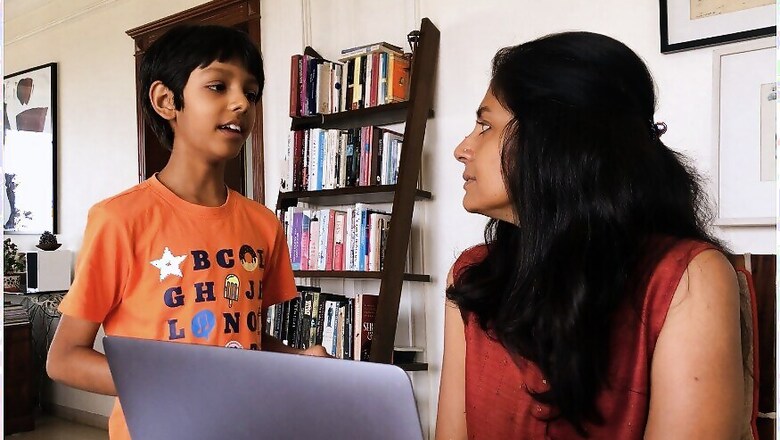
views
Listen to Her, a short film by filmmaker and actress Nandita Das tells the story of domestic violence that many women are facing during the lockdown. Needless to say, like most of her other directorial works, Listen to Her is also a thought provoking, nuanced, and beautifully made film. But, that is not why you MUST spare 7 minutes of your life to watch it. You must watch this film because it is perhaps the only work of art so far that encapsulates the plight of thousands of Indian women who are facing some form of abuse or another inside their own homes, where they have been asked to 'stay safe' during the lockdown.
Her film is important because through storytelling she brings to public consciousness the brutal incidents of domestic violence that is currently ongoing in many homes, which neither the government nor NGOs or women's organizations have yet been able to quantify comprehensively in terms of data. However, just because we are nowhere close to quantifying the problem, it does not mean that it doesn't exist. Ask any gender expert, women's NGO staffs, or Women Organization member and they will tell you that the few calls that helplines have received during this period, do not in any way, signify the full magnitude of domestic violence that women are facing as they stay locked up in their own homes with the perpetrators of abuse. Nandita's mastery as a writer and filmmaker also lies in the fact that she not only identifies the obvious kinds of abuse in the film -- physical, psychological as well as verbal -- but deftly puts a needle point on the more subtle kinds of abuse -- overburdening, emotional abuse, constant delegation -- that many choose to overlook on a regular basis.
Nandita recently spoke to News18 about her film, the guilt trap that women often fall into, the need for victims of domestic abuse to build a support system, and the cathartic power of sharing stories.
Here are a few excerpts from the interview.
Q: In your short film, Listen To Her, you have beautifully shown how women are being constantly overburdened by household chores during this lockdown. How do you think women should counter this subtle yet very difficult form of abuse? In some cases, where the husbands are particularly chauvinistic, raising issues over division of household chores, or asking them to contribute may further expose these women to the verbal, psychological, or physical forms of abuse. How should women cope with such situations?
A: Subtler forms of abuse are in fact more difficult to counter than the more obvious ones. Most of us face them often as we are primarily in a patriarchal society. Some of us, over the years have become more and more astute in catching the subtlest forms of sexism. Women first of all need to become more aware of it and confident to speak up and not just negotiate through these subtle forms of abuse. But each context is different so there can be no one solution for all. There are times when women call out abuse and get abused even more. Some take it as a process, gaining more strength through it, seeking help and finally a way out of that situation. But for some, it can shut them completely for good. So it depends upon each woman, her context and her ability to stand up to the abuse. But one thing we all must do is to build a good support system, a kind of sisterhood, where we can share freely. Even men who are empathetic, need to be part of that support system. Seeking help is definitely not a sign of weakness, it is only through helping each other that we can build our own strength.
Q: In cases of many Indian women, years of patriarchal conditioning have made them to believe that they are 'the nurturers and the caretakers of household'. So, many of them are unquestioningly trying to do every single task at home, while juggling a full-time office workload. They also operate from a place of guilt when they cannot 'do everything' they are expected to do by their husbands/in-laws, because they believe that the onus is on them to make sure that the household runs smoothly. How can such a mindset, that years of patriarchal upbringing has induced, be changed? I know there is no magic mantra for it, but what should at least be the initial steps to let such women know that they don't have to do everything alone, and if they cannot manage so much work, it's because it is not for one person to manage?
A: The best of us fall into the guilt trap when we are unable to do everything that is expected of us. We have to be kind to ourselves first and you in fact have answered it yourself, because it is not for one person to manage everything. Also we often put ourselves last. Even if we want to be good to our parents, partners, children, friends and colleagues, we first have to know that we need to truly be happy and not fatigued all the time. To take care of oneself is not benign selfish. It is self preservation. We are so deeply conditioned that we slip into guilt so easily. With all my work on gender issues for years, I still fall into the trap every now and then but that awareness is important for us to overcome it. Again, let's help each other and understand that guilt is not a healthy emotion. It is not a productive emotion. We juggle between so many things, that we end up not doing anything fully and then we feel guilty for not doing them well. But we are so often distracted as we are always trying to multitask. To be a great multi-tasker is not a compliment we should want. I would rather have the opportunity to focus on one thing at a time and I would do them better. With this awareness, slowly and surely we will understand that we are doing the best we can. Also we will then make others around us share the work, and make them realise that it is as much their responsibility as it’s ours.
Q: At the end of your short film, your character says, 'sab batao mujhe' to the victim of domestic violence. In real life, however, victims seldom get the opportunity to share their experiences, which is a very cathartic process for any victim of abuse. How important are mental health helplines --- for such women (as well as children or men) at a time like this -- which can provide them the safety of anonymity but also give them a space to share their feelings?
A: Helplines help survivors feel less alone, they are there to listen and help. Also the information is kept confidential, so it gives them a sense of security. The helpline operator may also be able to provide them with information about how to file an FIR, or whether there are any shelters close by if the survivor wishes to leave or how to protect oneself until help arrives. The survivor, in their anonymity, may feel a sense of trust with the person on the other side of the phone. They begin to get some courage as they have someone to make these difficult decisions with. One aspect that is often not accounted for is that domestic violence is not just about physical abuse but it’s also mental abuse. Often the trauma of such abuse is devastating, and having someone to talk to can help. A friend, a relative, anyone will listen with no judgement and pure compassion is when women feel safe to speak. And that is something we all can do. Listen to her.
Q: Lockdown has been a particularly difficult time for victims of sexual as well as domestic violence (as your film has so beautifully shown). They are continuously locked-up in the confined spaces with their perpetrators so it is hard for them to make 'that call to the helpline'. NGOs aren't on the ground either, so it may take longer for them to reach. Under such circumstances, they are incredibly vulnerable. What strategies/policies should the government come up with to stop domestic violence? How can community/society contribute to fighting this problem?
A: Even when there are policies in place, it seldom is effective because the stigma that surrounds these issues makes women not seek help. Often, the community and the law enforcers perpetuate this stigma by functioning from a moral standpoint that is deeply embedded within the patriarchal ideology. As you have pointed out earlier, there is no magic mantra to solve domestic violence overnight, however, engaging with this issue and bringing it in the public realm can create a shift in the mindset of people so that they do not blame and shame victims. The WHO has recognised that this issue of domestic violence has surged during the long lock down in India and around the world and have suggested some steps that can be taken by policy makers. For example, essential services should also include services to prevent violence against women and the women seeking help from the police and hospitals should not be penalized. It is true that often that call can be very difficult to make when one has no privacy. In such instances, a watchful and supportive neighbor or member of the community can help. The film is trying to address this issue and the overwhelming response and the women seeking help is a testimony that the first thing we have to do is to break the silence around it.
Q: How hard was it logistically to make this short film during a lockdown? What motivated you to make it?
A: There were more challenges than I had imagined. Since this film was conceived as a response to these trying times, and because I wanted to produce something spontaneously, I decided to shoot the film in lockdown. In both my films Firaaq and Manto people have often asked why I didn’t act even in a small role, to which my response has always been that I get so involved in directing that it would be too much of a distraction to have to act. Acting while wearing the director’s hat is confusing. In Listen to Her, I had to do everything. literally! Both, the director and my protagonist were overburdened with the multiple hats to wear. In all the chaos of switching between the actor and the director, and the clap girl, setting up camera, sound etc, what I focused least on was my performance.
I used my iPhone’s camera to record myself as I acted, used my old phone to record the sound separately and coordinated with two members of my team on Zoom who used software to be able to view the footage while I was shooting it. The scenes were shot in my living room as it is the best lit place in my home. However, we had to shoot over three days once we realized that the light would dramatically change by noon, becoming visibly warmer and more yellow. Once I found a steady perch for the phone to capture the perfect composition, I requested my cook, Bharat to help me. I would then run to my position, give my son instruction as he was a part of the frame, turn the audio recorder on my other phone, ask Bharat to start recording, clap to ensure that the sound and video will synch and begin to act. Amidst all this chaos, I realized that it was difficult to remember the dialogues I had written word for word, and so I found myself improvising which was not very challenging because I knew the crux of what was being said. This ordeal reminded me once again that filmmaking was after all a collaborative process.The easiest part of the process was reaching out to other professionals, some of the best in the industry who readily agreed to contribute to this film remotely in the post production stage.
The surge in domestic violence cases during the lockdown is more than even what we are hearing. I participated in an online campaign to break the silence around it. When I read an article in the New York Times, When Mom’s Zoom Meeting is the One that has to Wait, it reaffirmed that this overburdening of work is also a form of abuse. And during this period, many women find themselves locked up with their abusers and slowly there were whispers heard about this too. So I brought these two issues together to spontaneously respond to the idea of “STAY HOME, STAY SAFE”. The irony of it should not be lost on us. I am glad that the film is sparking conversations around it to encourage women to speak up and for us to listen when they do. Such short films can help spread awareness and we can share helplines numbers widely.
(Note: If you want to report a case of domestic violence kindly call the National Commission for Women (NCW) at 7217735372.)



















Comments
0 comment